Follow the Money? – European Integration in Light of EU Budgetary Law
9th and 10th June 2022
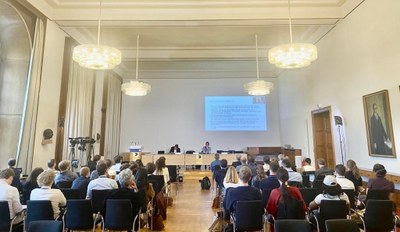
On 9th and 10th of June 2022 the second DynamInt conference, which was organised by Dr. Ruth Weber, took place at Humboldt-University Berlin on the topic „Follow the Money? – European Integration in Light of EU Budgetary Law”. The conference panels were composed of experts from law, economics, political and historical sciences. Furthermore, over 70 researchers, practitioners and students from various German and international universities and institutions attended the two-day event in person and online.
Featuring presentations and panel discussions, the conference addressed the economic and legal developments of European fiscal policy and budgetary law. With the 2020 recovery fund NextGenerationEU and its first large-scale issuing of debts on EU level, debating the future of the European Union’s fiscal architecture gained fundamental importance. The role of the EU economic and fiscal constitution for European integration formed the common link of the different panels. In four thematic sessions, 13 panelists presented their views, on the first day with a focus on historic and present phenomenons of the fiscal structure of the EU while the discussions of the second day concentrated on possible future developments.
The first session on the first conference day was about possible underlying design flaws of the European Monetary Union. Prof. Dr. Paul De Grauwe (London School of Economics and Political Science) presented an analysis of the fragility of the Eurozone and brought forward his economic ideas for its further development. Sir Paul Tucker (Harvard University) examined the unusual role of the ECB in EU fiscal policy and argued that it does not care predominantly about inflation, but more about other goals like the preservation of the Eurozone.
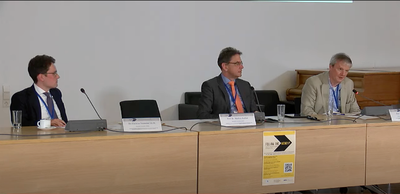
In the following history-oriented panel Prof. Dr. N. Piers Ludlow (London School of Economics and Political Science) classified historic budgetary breakthroughs as an important driving factor for integration in the 1980s, while Dr. Christian Neumeier (Humboldt-University Berlin) explained the reasons for the introduction of a European Monetary Union without simultaneous fiscal integration that became visible during the past decade. In the following discussion, several participants drew parallels to the EU’s current situation.
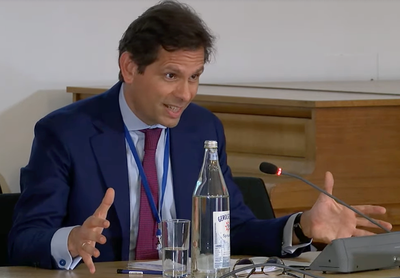
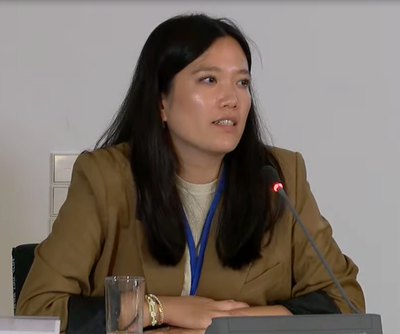 The second session in the afternoon focused on addressing the legality and economic implications of the innovative policy-making taken at EU level in response to the Covid-19 pandemic. Alberto de Gregorio Merino (Director at the Legal Service of the Council of the European Union) presented an inside perspective on NextGenerationEU and the rule of law mechanism which Dr. Thu Nguyen (Jacques Delors Centre, Hertie School) complemented with an overview of EU economic policy coordination after the Recovery and Resilience Facility and its link to the European Semester.
The second session in the afternoon focused on addressing the legality and economic implications of the innovative policy-making taken at EU level in response to the Covid-19 pandemic. Alberto de Gregorio Merino (Director at the Legal Service of the Council of the European Union) presented an inside perspective on NextGenerationEU and the rule of law mechanism which Dr. Thu Nguyen (Jacques Delors Centre, Hertie School) complemented with an overview of EU economic policy coordination after the Recovery and Resilience Facility and its link to the European Semester.
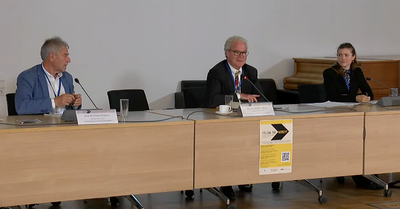
In her legal assessment of NextGenerationEU, Prof. Dr. Claudia Wutscher (Vienna University of Economics and Business) raised doubts about its compatibility with European and constitutional law, especially in light of its unprecedented high volume. Prof. Dr. Charles Wyplosz (The Graduate Institute, Geneva) critically questioned from an economic perspective whether the programme’s grand ambition will ultimately lead to its failure.
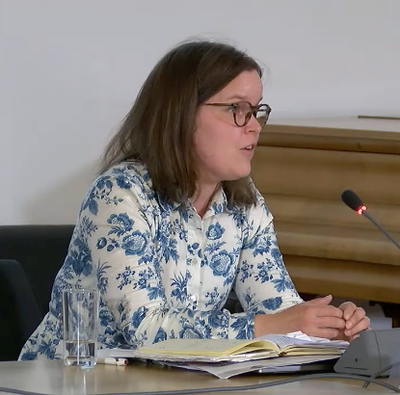 The topic of the third session on the second conference day was the role of economic crises as turning points for European integration. Prof. Dr. Thomas Biebricher (Copenhagen Business School) provided an analysis of the parallels between the political theory of neoliberalism and the development of the European Union. On the basis of her legal analysis, Prof. Dr. Päivi Leino-Sandberg (University of Helsinki) pointed out a perspective for fiscal integration beyond crisis management, whereas Prof. Dr. Claire Mongouachon (Université Paris Nanterre) presented a French proposal for a new fiscal framework of the European Monetary Union.
The topic of the third session on the second conference day was the role of economic crises as turning points for European integration. Prof. Dr. Thomas Biebricher (Copenhagen Business School) provided an analysis of the parallels between the political theory of neoliberalism and the development of the European Union. On the basis of her legal analysis, Prof. Dr. Päivi Leino-Sandberg (University of Helsinki) pointed out a perspective for fiscal integration beyond crisis management, whereas Prof. Dr. Claire Mongouachon (Université Paris Nanterre) presented a French proposal for a new fiscal framework of the European Monetary Union.
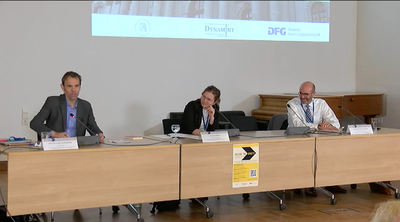
The fourth and last session looked at the relationship of European integration and economic and fiscal policy. According to Prof. Dr. Luuk van Middelaar‘s (Leiden University) analysis of recent European politics, the European Union is moving towards a more political union characterised by strategic spending. Drawing parallels to the developments in the 1970s, Prof. Dr. Frank Schorkopf (Georg-August-Universität Göttingen) found a integration surplus of EU budgetary law and emphasised the important role of the European Parliament when it comes to budget authority.
The current topic of the conference and the different possible approaches led to intensive and heated discussions between the participants. The panel discussions were continued in the breaks as well as over a shared dinner on Thursday evening.
The debate was also taken up beyond the on-site event as Maximilian Steinbeis reported on the Verfassungsblog about the conference. A publication of the conference contributions is currently being planned and further information will be provided on this website.
For more information see also the invitation to the conference and the programme.
